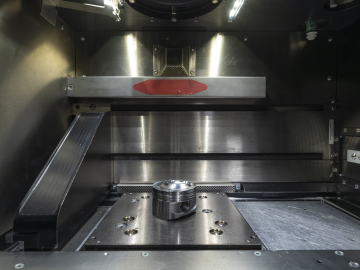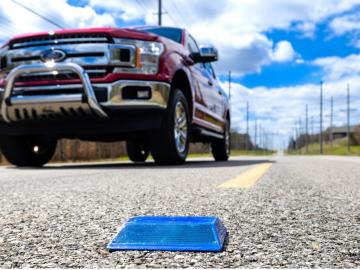
Filter News
Area of Research
- Advanced Manufacturing (1)
- Biology and Environment (6)
- Computational Engineering (1)
- Computer Science (4)
- Energy Science (28)
- Fusion and Fission (2)
- Isotopes (1)
- Materials (12)
- Materials for Computing (4)
- National Security (9)
- Neutron Science (8)
- Nuclear Science and Technology (1)
- Quantum information Science (2)
- Supercomputing (34)
News Type
News Topics
- (-) Computer Science (79)
- (-) Transportation (37)
- 3-D Printing/Advanced Manufacturing (59)
- Advanced Reactors (14)
- Artificial Intelligence (46)
- Big Data (17)
- Bioenergy (29)
- Biology (30)
- Biomedical (21)
- Biotechnology (12)
- Buildings (22)
- Chemical Sciences (44)
- Clean Water (2)
- Composites (14)
- Coronavirus (17)
- Critical Materials (11)
- Cybersecurity (18)
- Education (3)
- Element Discovery (1)
- Emergency (1)
- Energy Storage (48)
- Environment (51)
- Exascale Computing (23)
- Fossil Energy (1)
- Frontier (24)
- Fusion (19)
- Grid (21)
- High-Performance Computing (46)
- Irradiation (1)
- Isotopes (24)
- ITER (3)
- Machine Learning (17)
- Materials (71)
- Materials Science (60)
- Mercury (2)
- Microelectronics (1)
- Microscopy (20)
- Molten Salt (3)
- Nanotechnology (32)
- National Security (23)
- Neutron Science (61)
- Nuclear Energy (36)
- Partnerships (34)
- Physics (27)
- Polymers (14)
- Quantum Computing (16)
- Quantum Science (35)
- Security (12)
- Simulation (15)
- Software (1)
- Space Exploration (3)
- Statistics (1)
- Summit (24)
Media Contacts

The Department of Energy’s Office of Science has allocated supercomputer access to a record-breaking 75 computational science projects for 2024 through its Innovative and Novel Computational Impact on Theory and Experiment, or INCITE, program. DOE is awarding 60% of the available time on the leadership-class supercomputers at DOE’s Argonne and Oak Ridge National Laboratories to accelerate discovery and innovation.

Scientists at ORNL used their expertise in quantum biology, artificial intelligence and bioengineering to improve how CRISPR Cas9 genome editing tools work on organisms like microbes that can be modified to produce renewable fuels and chemicals.

As vehicles gain technological capabilities, car manufacturers are using an increasing number of computers and sensors to improve situational awareness and enhance the driving experience.

The Department of Energy’s Oak Ridge National Laboratory announced the establishment of the Center for AI Security Research, or CAISER, to address threats already present as governments and industries around the world adopt artificial intelligence and take advantage of the benefits it promises in data processing, operational efficiencies and decision-making.

Subho Mukherjee, an R&D associate in the Vehicle Power Electronics Research group at the Department of Energy’s Oak Ridge National Laboratory, has been elevated to the grade of senior member of the Institute of Electrical and Electronics Engineers.

Dean Pierce of ORNL and a research team led by ORNL’s Alex Plotkowski were honored by DOE’s Vehicle Technologies Office for development of novel high-performance alloys that can withstand extreme environments.


Working with Western Michigan University and other partners, ORNL engineers are placing low-powered sensors in the reflective raised pavement markers that are already used to help drivers identify lanes. Microchips inside the markers transmit information to passing cars about the road shape to help autonomous driving features function even when vehicle cameras or remote laser sensing, called LiDAR, are unreliable because of fog, snow, glare or other obstructions.

Computing pioneer Jack Dongarra has been elected to the National Academy of Sciences in recognition of his distinguished and continuing achievements in original research.

SAE International has awarded ORNL Buildings and Transportation Science Division Director Robert Wagner with the SAE Medal of Honor for his dedication and support of the organization’s mission of advancing mobility solutions.


